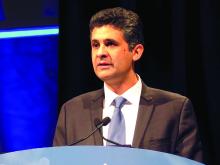SAN FRANCISCO – Darolutamide, a novel investigational antiandrogen agent, is efficacious and well tolerated when used to treat nonmetastatic, castration-resistant prostate cancer (nmCRPC), according to results of the phase 3, randomized, controlled ARAMIS trial.
“In men with high-risk M0 CRPC, two next-generation androgen receptor inhibitors, namely, enzalutamide (Xtandi) and apalutamide (Erleada), were recently shown to improve metastasis-free survival, although they were associated with increased cognitive impairment, falls, and other side effects,” commented lead investigator Karim Fizazi, MD, PhD, head of the department of cancer medicine at the Institut Gustave Roussy in Paris. “Enzalutamide and apalutamide are chemically very similar, while darolutamide is structurally distinct. Also, darolutamide does not cross the blood-brain barrier, which may result in less CNS-related side effects.”
ARAMIS enrolled 1,509 men with nmCRPC who had a prostate-specific antigen (PSA) doubling time of 10 months or less and were on and continued androgen deprivation therapy. The men were randomized 2:1 to receive darolutamide or placebo.
With a median follow-up of 17.9 months, median metastasis-free survival was almost 2 years longer with darolutamide, corresponding to a 59% reduction in the risk of distant metastases or death, relative to placebo, according to results reported at the symposium and simultaneously published in the New England Journal of Medicine (2019 Feb 14. doi: 10.1056/NEJMoa1815671). There was also a 29% reduction in risk of death (in an interim analysis), a 35% reduction in risk of pain progression, and 57% reductions each in need for chemotherapy and first symptomatic skeletal events. Meanwhile, the drug had a good safety and tolerability profile, with rates and types of events similar to those seen with placebo.
“We believe that darolutamide should become a new standard of care for men with high-risk nmCRPC,” Dr. Fizazi concluded.
Practice-changing results?
The ARAMIS findings meet some – but not all – of a set of criteria that would support a change in current practice to using darolutamide, according to invited discussant Ian D. Davis, MBBS, PhD, a professor at Monash University, Melbourne.
The first criterion, whether the disease is a condition needing treatment, is likely met, as 69% of patients had a PSA doubling time of 6 months or less, and previous research suggests that this subset, at least, has high risk for bone metastases or death.
A second criterion is whether metastasis-free survival is a meaningful endpoint. “It is according to the FDA [Food and Drug Administration],” Dr. Davis said, noting that they now accept it as a registrable endpoint in nmCRPC if it is supported by positive secondary endpoints. “But are we talking about a sensitivity question here, is M0 a rapidly disappearing condition,” given that new imaging technologies often do reveal metastases in this population? “And is metastasis-free survival truly a surrogate for overall survival? I think those questions are still open, and we need to use our own judgment.”
Darolutamide appears to have acceptable toxicity, a third criterion, but information regarding its impact on subsequent treatment efficacy, a fourth criterion, is still lacking.
The fifth and final criterion, cost-effectiveness, can be assessed using the incremental cost-effectiveness ratio. But because overall survival benefit and price of darolutamide are still unknown, calculations of cost per life-year saved are not yet possible.
“So at the moment, I think it’s unclear whether ARAMIS should change practice,” Dr. Davis concluded. “I would certainly be prepared to change my conclusions on this with more information and further follow-up.”
Study details
The men randomized in ARAMIS had a median PSA doubling time of roughly 4.5 months, Dr. Fizazi reported at the 2019 Genitourinary Cancers Symposium sponsored by the American Society for Clinical Oncology, the American Society for Radiation Oncology, and the Society of Urologic Oncology. Only about 5% were receiving a bone-sparing agent.
Median metastasis-free survival was 40.4 months with darolutamide and 18.4 months with placebo (hazard ratio, 0.41; P less than .0001). Benefit was similar across a range of subgroups.
In an interim analysis, median overall survival was not reached in either group, but the 3-year rate was 83% with darolutamide and 73% with placebo (hazard ratio, 0.71; P = .0452). The drug also was superior in terms of progression-free survival (36.8 vs. 14.8 months; HR, 0.38; P less than .0001), time to pain progression (40.3 vs. 25.4 months; HR, 0.65; P less than .0001), time to cytotoxic chemotherapy (not reached vs. 38.2 months; HR, 0.43; P less than .0001), and time to first symptomatic skeletal event (not reached in either group; HR, 0.43; P = .0113).
Patients in the darolutamide and placebo groups had similar rates of treatment discontinuation because of any-grade treatment-emergent adverse events (8.9% vs. 8.7%) and because of grade 3 or 4 treatment-emergent adverse events (3.3% vs. 4.3%). The former had a higher rate of any-grade fatigue/asthenia (15.8% vs. 11.4%), but this difference was no longer evident after adjustment for duration of exposure, according to Dr. Fizazi. Notably, the groups were similar on rates of bone fractures, falls, cognitive disorders, seizures, hypertension, and coronary artery disorders.
Finally, darolutamide was also associated with better health-related quality of life, with men in that group having lower scores for pain interference, pain severity, and urinary symptoms (P less than .01 for all).
Dr. Fizazi reported that he receives honoraria from Astellas Pharma, Janssen, Merck, and Sanofi; that he has a consulting or advisory role with Amgen, Astellas Pharma, AstraZeneca, Bayer, Clovis Oncology, CureVac, ESSA, Janssen Oncology, Orion Pharma, Roche/Genentech, and Sanofi; and that he receives travel, accommodations, and/or expenses from Amgen and Janssen. The trial was sponsored by Bayer.
SOURCE: Fizazi K et al. GUCS 2019, Abstract 140.



